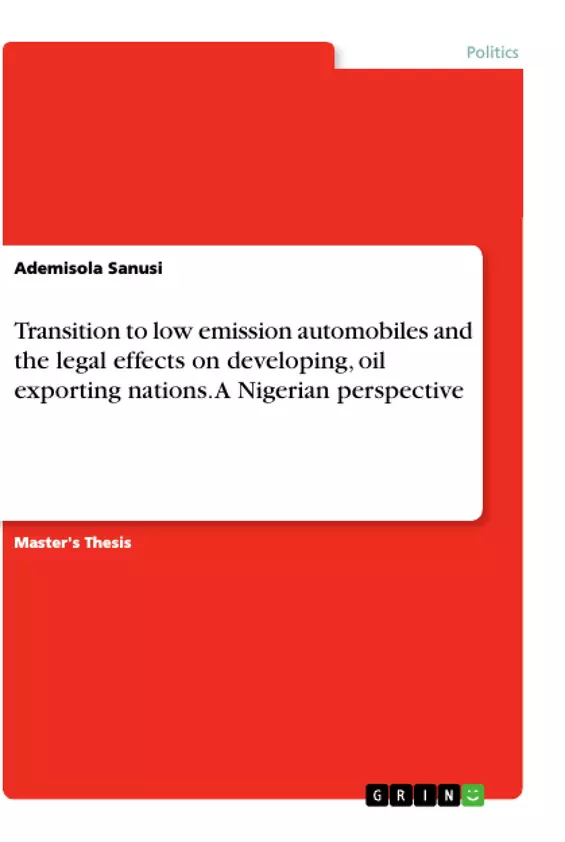This work is a consideration of the evolution of the transportation sector towards a more sustainable attitude. It aims to assess the international regulatory frameworks created to reduce the carbon footprint of the global automotive and transport sector, through the promotion of low emission standards and more innovative / sustainable methods in the transportation sector to be met by nations around the world. The effect of the evolving transportation sector on West African countries, and specifically in Nigeria will be evaluated.
Globally, the importance of the automotive sector cannot be overemphasized. A resulting effect of this booming sector however is its contribution to Greenhouse Gas emissions, which has become a situation of global environmental concern. Due to this, there have been new developments globally, and evolving emission laws and standards have been set and are being strictly followed by the West. According to the United Kingdom Energy Research Centre, UKERC, there lays the speculation that global “conventional oil” reserves will be curbed by depletion before 2030.
Primary consensus however is on the effects the transport sector has on the climate change and global warming phenomenon, the technological advancements in the sector which have been developed to help manage the effects of climate change and, the legal developments that have come about as a result of the developments and advancements. Climate change is one of the key global policy issues of our time. Transport is the sector from which it has been hardest to cut emissions and, to make substantial progress in the future, action will be required at all levels of government in all nations across the globe.
Inhaltsverzeichnis (Table of Contents)
- ABSTRACT
- CHAPTER 1
- 1.1. INTRODUCTION
- 1.2. METHODOLOGY
- 1.3. RESEARCH QUESTIONS AND OBJECTIVES
- 1.4. LITERATURE REVIEW
- CHAPTER 2: NIGERIA: OIL SECTOR, STRUCTURES AND ISSUES.
- 2.1: NIGERIA'S OIL SECTOR AND STRUCTURES.
- 2.2: NIGERIA AND THE RESOURCE CURSE.
- 2.3: NIGERIA AND THE DUTCH DISEASE.
- CHAPTER 3: CLIMATE CHANGE AND DEVELOPMENTS IN THE AUTO INDUSTRY.
- 3.1: TECHNOLOGICAL ADVANCEMENTS IN THE AUTOMOTIVE INDUSTRY.
- 3.2: CLIMATE CHANGE AND GLOBAL WARMING: AGREEMENTS, PROTOCOLS, SIGNATORIES AND ADOPTION EXAMPLES.
- CHAPTER 4: THE NIGERIAN LEGAL FRAMEWORK ON COMBATTING CLIMATE CHANGE.
- 4.1: CLIMATE CHANGE IN NIGERIA
- 4.2: NIGERIA'S LEGAL AND POLICY FRAMEWORK IMPLEMENTATION FOR TACKLING CLIMATE CHANGE.
- CHAPTER 5: CONCLUSIONS
- 5.1: CONCLUSIONS AND RECOMMENDATIONS.
Zielsetzung und Themenschwerpunkte (Objectives and Key Themes)
This dissertation aims to analyze the transition to low-emission automobiles and its legal effects on developing, oil-exporting nations, focusing specifically on Nigeria. The study examines the international regulatory frameworks promoting low-emission standards and sustainable transportation methods, evaluating their impact on West African countries, particularly Nigeria. The paper also analyzes the legal frameworks developed or proposed to combat climate change effects in Nigeria, exploring the challenges and shortcomings. Furthermore, it highlights the practical limitations faced by developing nations, especially in sub-Saharan Africa, in mitigating climate change and establishing effective legal systems.
- The role of the automotive sector in climate change.
- The impact of global oil depletion on developing economies.
- The legal framework for regulating vehicle emission standards in Nigeria.
- The challenges and limitations of implementing climate change mitigation measures in developing nations.
- The implications of the transition to low-emission automobiles for oil-producing and oil-exporting states.
Zusammenfassung der Kapitel (Chapter Summaries)
Chapter 1 provides an introduction to the research, outlining the methodology, research questions, and objectives. It also discusses the literature review, highlighting the importance of the automotive sector and its contributions to greenhouse gas emissions. Chapter 2 explores the oil sector in Nigeria, analyzing the country's economic structures, its dependence on oil revenues, and its vulnerability to the resource curse and Dutch disease. Chapter 3 delves into climate change and its impact on the automotive industry, examining technological advancements in the sector and international agreements aimed at reducing emissions. Chapter 4 focuses on Nigeria's legal framework for combating climate change, analyzing the country's legal and policy framework implementation for tackling climate change.
Schlüsselwörter (Keywords)
The main keywords and focus topics of this dissertation include: low-emission automobiles, climate change, developing nations, oil exporting countries, Nigeria, legal framework, vehicle emission standards, international regulatory frameworks, sustainable transportation, resource curse, Dutch disease, global oil depletion.
Frequently Asked Questions
How does the automotive sector contribute to climate change?
The automotive sector is a major source of greenhouse gas emissions globally. Transitioning to low-emission vehicles is seen as critical to cutting these emissions and meeting international climate goals.
What is the "Resource Curse" in the context of Nigeria?
The Resource Curse refers to the paradox where countries with an abundance of natural resources, like oil in Nigeria, tend to have less economic growth and worse development outcomes than countries with fewer resources.
What is the legal framework for climate change in Nigeria?
Nigeria has established various legal and policy frameworks to tackle climate change, although implementation faces significant challenges due to economic dependence on oil revenues.
How does global oil depletion affect developing nations?
As conventional oil reserves deplete, oil-exporting nations like Nigeria face economic instability, necessitating a transition to more sustainable economic and transportation models.
What are the barriers to low-emission transport in West Africa?
Barriers include lack of infrastructure, limited financial resources for technological adoption, and the need for stronger legal systems to enforce emission standards.
- Citar trabajo
- Ademisola Sanusi (Autor), 2019, Transition to low emission automobiles and the legal effects on developing, oil exporting nations. A Nigerian perspective, Múnich, GRIN Verlag, https://www.grin.com/document/540076



